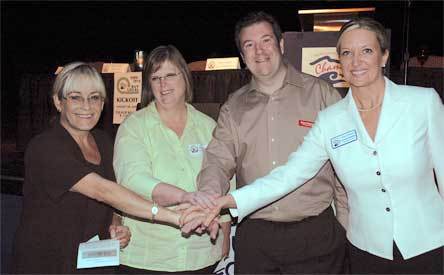TULALIP — The Aug. 28 Business Before Hours meeting of the Greater Marysville Tulalip Chamber of Commerce served as the kick-off for the “Buy Local” awareness campaign, as representatives of the city and community of Marysville teamed up with representatives of four area newspapers to tout the benefits of both the awareness campaign and its message.
City of Marysville Public Works Director Kevin Nielsen explained that sales tax revenues are a critical source of funds for repairs and maintenance of city streets and sidewalks. He estimated that half of the city’s budget for its streets comes from sales tax revenues and noted that the summer heat damages city sidewalks enough to make their repair even more vital. He added that much of the city’s streets budget is devoted to crack and chip seals and overlays that are intended to delay the need for larger capital projects.
“Every day, we’ve been discussing in our own workshops what we can do, and I’ve been telling people all along — buy local,” Nielsen said. “It directly benefits the city.”
Nielsen pointed out that sales tax revenues also fund sanding and snow removal, which in turn support local businesses by allowing people to conduct their holiday shopping during the winter. Speaking on behalf of city of Marysville Parks and Recreation Director Jim Ballew, Nielsen cited the number of the city’s athletic and entertainment programs that are funded by sales tax revenues, which he identified as a benefit in turn to the Marysville Police Department.
Marysville Police Chief Rick Smith agreed with Nielsen’s assessment, crediting the city’s Parks and Recreation Department with giving local young people places to go and ways to stay out of trouble, which reduces the demand on the police department. According to Smith, most of the police department’s budget comes from the general fund, which is reliant upon sales tax revenues.
While Smith acknowledged the call for “more cops on the street,” he asserted that the needs of the police department are “bigger than that,” and include updated and enhanced infrastructure and technology, in addition to more personnel.
Smith expressed regret over the cuts that were made to the police department’s training budget. He also characterized the department’s 28.6 percent reduction in general crime in the city in 2007-08 as the result of proactive policing, which he hopes the “Buy Local” campaign will enable Marysville police to carry out even further.
Marysville School District Superintendent Dr. Larry Nyland explained that the school district receives one-fifth of its funds from local property taxes, with the rest coming from the state, but he noted that the district still benefits from programs such as the school resources officer furnished by the Marysville Police Department. He pointed out the number of smaller businesses in the Marysville community whose owners and employees are local residents, and asserted that by supporting those businesses, the “Buy Local” campaign can result in their owners and employees spending more of their own money in the community, thereby serving as a multiplier for both jobs and businesses.
“We remind our school district staff to buy local,” Nyland said. “The construction at Getchell has about 100 workers every day, a lot of whom are locals. And I know Hilton’s Pharmacy appreciates area employees having health benefits, so that they can buy their prescriptions locally. We can keep these dollars at home.”
Jerry Gadek, development director of the Salvation Army of Everett and Snohomish County, followed on Nyland’s comments about the numbers of homeless children in the area by identifying a link between successful businesses and robust contributions to charities versus struggling businesses and diminished contributions to charities.
“I’m the only one here who doesn’t want to gain customers,” Gadek said. “I want to get rid of my customers.”
Sean Flaherty, classified advertising director for The Daily Herald, praised the “Buy Local” campaign as “a great idea” that will market businesses through the participating newspapers throughout the month, as well as through the chamber newsletter and local access television, but he still urged attendees to take the campaign to the next level by “going viral” with its “strong message.”
Beckye Randall, co-owner of the North County Outlook, followed on Flaherty’s advice by acknowledging that pitching “Buy Local” to the chamber was akin to “preaching to the choir,” and advised them to educate the public on the benefits of “Buy Local.” She cited the success of a Whatcom County “Buy Local” campaign in changing the shopping habits of three-fifths of its local households, and credited “Buy Local” campaigns with helping participating businesses experience only half the holiday retail declines experienced by non-participating businesses in 2008.
“Serve, think, shop, dine, employ, support, buy local,” said DeAnna Emborski, chair of the “Buy Local” committee and publisher of The Marysville Globe, The Arlington Times and the Bellingham and The Wenatchee business journals. “Those eight words can have a dramatic effect on a community. For companies within multimedia to agree on a message like this is unprecedented and I’m honored to work with our brethren media on this campaign. This will affect the livelihoods and lifestyles of every person in this room. The support you give these businesses will come back to you, but this is not a secret that you can keep to yourselves. Many businesses have said that their number one source of business is referrals, and what you’re doing here is referring yourselves. We need to support each other to keep this a viable, vibrant community.”
For the following monthly rates, “Buy Local” advertisers will appear in each of the four participating newspapers, and in the chamber newsletter, once per month, for a total of five ads monthly, reaching more than 195,957 Snohomish County residents and businesses. Twenty-five dollars per month will feature a company’s name and phone number, while $50 per month will provide the company’s name, logo, address, phone number and Web site.
To participate in “Buy Local,” contact Emborski by phone at 360-659-1300, or via e-mail at demborski@marysvilleglobe.com.







